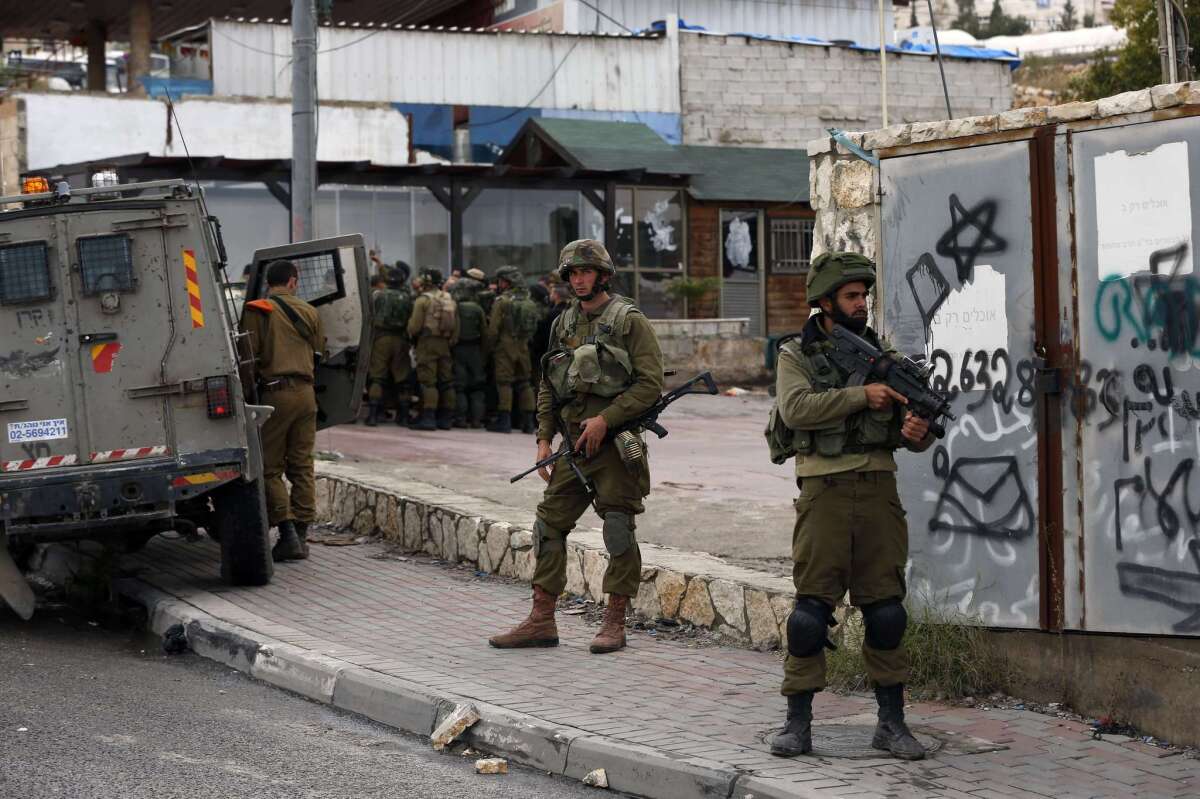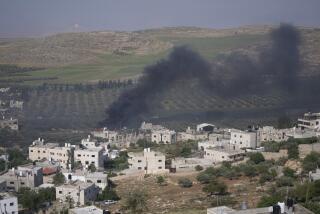Israel announces arrests in arson attack that killed Palestinian toddler and parents

Israeli security forces in the West Bank village of Hizma.
- Share via
Reporting from Jerusalem — Four months after the arson assault that killed a Palestinian toddler and his parents, Israeli police on Thursday announced the arrest of several Jewish extremists suspected of belonging to a militant organization that carried out the attack and others.
The investigation, conducted by police, justice authorities and Shin Bet, the domestic intelligence service, was looking into “concrete suspicions” related to the fatal attack, the police statement said. All other information, including details that could identify the suspects, were barred from publication by a court-issued gag order.
In the predawn hours of July 31, assailants threw a firebomb into the Dawabshe family’s home as they slept in the West Bank village of Duma. Ali Dawabshe, 18 months old, perished in the fire. His parents, Saad and Riham, fled the flames with another son and were taken to hospitals in Israel with extensive burns.
In the weeks after the attack, both parents died of their injuries, leaving 4-year-old Ahmad the sole survivor of the family.
Hussein Dawabshe has been at his grandson’s bedside at the Sheba Medical Center at Tel Hashomer, where he is recovering from severe burns but still has a long way to go. Ahmad does not yet know his family is dead.
“He is in pain. He cries at night. He asked when he can go home and where his parents are,” the grandfather said. “I cannot bear to answer him.”
Hussein Dawabshe heard about the arrests from news reports. “Four months is a long time,” he said.
Thursday’s announcement followed statements by security sources this week about a “dramatic development” in a case under wraps, triggering a flurry of reports that hinted at the Duma attack without naming it. That led to the partial lifting of the court gag order Thursday to allow the announcement that arrests had been made.
It also came after months of fierce criticism that Israel was not doing enough to apprehend the perpetrators — widely assumed to be Jewish extremists — and calls that Israel apply the same swift determination and harsh measures to Jewish attackers of Palestinians as it does to Palestinian attackers of Jews.
The criticism grew after Defense Minister Moshe Yaalon revealed several weeks ago that authorities knew the killers’ identities but could not indict them without compromising intelligence sources.
Former Shin Bet officials and observers of Jewish extremists frequently comment on the difficulty Israeli intelligence services have in solving attacks carried out by the small, highly insular circles that are virtually impenetrable.
According to Yisrael Hasson, a former deputy director of the Shin Bet who now heads the Israel Antiquities Authority, officials lack tools that would be allowed if such cases were legally defined as terrorism, such as special permission for more rigid interrogation. Also, security agencies often have the intelligence but have difficulty converting it into evidence sufficient for trial.
In a media interview, Hasson said he hoped this case would lead to an indictment and trial. But he noted that the wording of the police statement was vague, suggesting there was not enough solid evidence or a significant enough breakthrough in the investigation at this point.
Reiterating that investigators must be given adequate tools to deal with Jewish extremists, Hasson said, “We cannot leave our fate in the hands of such lunatic killers that are like any other terror organization.”
Asked whether homes of Jewish attackers should be demolished, as is sometimes done with Palestinians, Hasson expressed reservations about the practice.
“I believe it is effective only in very, very specific cases,” he said. “But if authorities think it is effective, then there should be a single standard and ruler for all murderers and terror.”
After years of cat-and-mouse with Jewish extremists attacking Palestinians in the West Bank and other targets inside Israel, the Duma attack prompted authorities to use the controversial tactic of administrative detention, largely reserved for Palestinians, for Jewish suspects.
Several attorneys representing the suspects, some of whom are minors, said they were barred from meeting their clients and protested that that was a violation of their rights.
Sobelman is a special correspondent.
More to Read
Sign up for Essential California
The most important California stories and recommendations in your inbox every morning.
You may occasionally receive promotional content from the Los Angeles Times.













